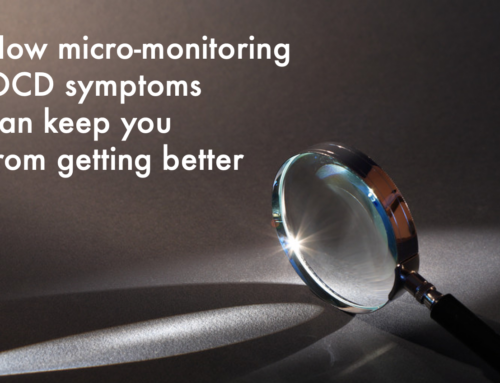 Is OCD right, or just lucky?
Is OCD right, or just lucky?
Have you ever had something bad happen to you that your OCD used as proof that it’s been right all along? “See! See! This is why we need to [insert annoying compulsion here]! I told you so!”
If this has happened to you, then you’ll find comfort in the following: according to at least one expert (Princeton economist Burton Malkiel in “A Random Walk Down Wall Street”) sometimes a blindfolded monkey throwing darts at stock listings in a newspaper can pick a stock portfolio that performs just as well as one chosen by a professional investor.
In other words, sometimes luck or randomness or something other than expertise prevails, and you might not have to know what you’re doing to get something right. So …. I’m sorry, OCD. (But not really.) You and the blindfolded monkey can leave now and go console each other over a banana split.
 What we are (and are not) trying to prove with ERP for OCD
What we are (and are not) trying to prove with ERP for OCD
The point of this post, however, goes beyond the fact that sometimes OCD (and the monkey) get lucky. To illustrate, let me share a conversation I often have with clients somewhere along our journey of doing exposure and response prevention for OCD:
Me: One of the the main goals of doing ERP is corrective learning. What that means is that we’re trying to prove that the problematic belief underlying your OCD is incorrect. The problematic belief isn’t what we think it is, though. For instance, your OCD tells you that you will get sick if you touch doorknobs, right?
Client: Yes, that’s what it says.
Me: But we aren’t trying to prove that you can’t get sick from touching doorknobs. Why aren’t we trying to prove that?
Client: Well, because we can’t really prove that. I might get sick from touching a doorknob.
Me: Right, you might. Or you might not. And even if you got sick after touching a doorknob, it would be extremely hard, if not impossible, to prove if it was the doorknob that made you sick.
Client: That’s true, although my OCD tells me it would definitely have been the doorknob that did it.
Me: Of course, because that’s what OCD does. But the problematic belief we’re trying to disprove is not about getting sick. It’s about uncertainty. For you, the problematic belief is probably something like, “I can’t handle the uncertainty of not knowing whether I might get sick from touching the doorknob.” Does that sound right?
Client: Yes, that sounds about right.
Me: So what we’re trying to prove is that you can handle the uncertainty of not knowing. And do you remember what we talked about in our last session, about our overall goal in OCD treatment?
Client: To live in a world of uncertainty and be happy anyway?
Me: Exactly. That’s what we’re trying to achieve.
Living in a world of uncertainty and being happy anyway
Going through treatment for OCD and doing ERP is not about proving that bad things can’t happen. Because they can. Just like sometimes monkeys perform better than professionals in picking stocks. If we go into treatment with the goal of proving things are “safe,” we’re setting ourselves up for failure, because bad things inevitably will happen from time to time.
Instead, ERP is about learning to live in a world of uncertainty, where we have no control over the majority of things, and trying to live a happy life anyway. It’s not about the OCD content, such as getting sick from touching doorknobs. It’s about learning we can handle the uncertainty of not knowing whether we might get sick from touching a doorknob, and using the doorknob as intended anyway because we want to, because it allows us to open the door to a full life … one not controlled by OCD.
To learn more about living in a world of uncertainty and being happy anyway, and how I learned this concept from Dr. Jonathan Grayson, see Chapter 12 of Fred, “Playing a New Game,” and Chapter 19 of Fred, “A New Rule #1.”
Learn more about taming OCD
Sign up for my Shoulders Back! newsletter to receive OCD-taming tips & resources, including notifications of new blog posts, delivered every month to your inbox.
My blogs are not a replacement for therapy, and I encourage all readers who have obsessive compulsive disorder to find a competent ERP therapist. See the IOCDF treatment provider database for a provider near you. And never give up hope, because you can tame OCD and reclaim your life!
Photo credit (c) Can Stock Photo / Krisdog







Dear Ms Nicely,
But how can you deal with a similar situation if your OCD is about magical thinking? The dangers of a doorknob are within the realms of probability and science, everyone touches them, so everyone lives with that danger, but not everyone suffers from intrusive thoughts. How can you learn to trust yourself again after things have happened that OCD related to something in your own mind? If you can’t keep the thoughts from arising within yourself?
Believe it or not, everyone does have intrusive thoughts. Intrusive thoughts aren’t the OCD, but instead the OCD is the negative reaction to the intrusive thoughts. OCD will tell you that it’s easy for people with other types of OCD that are “more realistic” to do ERP and succeed because it likes to make you think that your type of OCD is “special” and therefore cannot be addressed with ERP, but that’s just OCD trying to sabotage your success. Doing ERP repeatedly helps your brain learn it can handle the uncertainty in a situation, and OCD is about the uncertainty, not the content (i.e. a particular thing that happened). I’d encourage you to find an OCD therapist who could help guide you through this process, as OCD is sneaky and will say almost anything to keep you from proceeding with ERP so it can stay in charge!
Thank you. Your posts help to give me the strength to push on and past OCD.